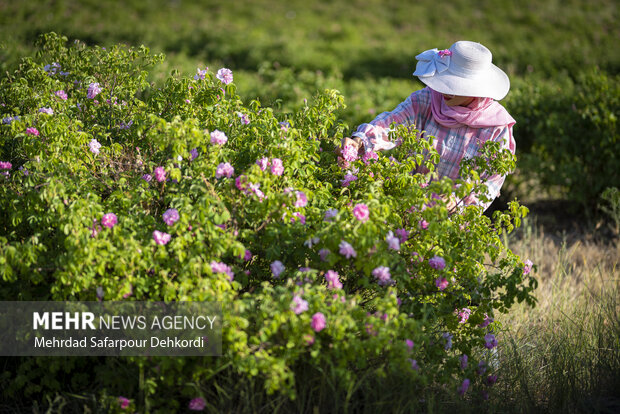Iran Rose Water Festival; When desert breathes in fragrance

TEHRAN, Jun. 09 (MNA) – Each spring, the air in Kashan fills with the delicate scent of blooming damask roses. This is Golabgiri — the enchanting Rose Water Festival, where tradition, aroma, and beauty come together in a timeless celebration.
Each spring, a captivating aroma takes over the towns of Qamsar and Niasar, turning the region into a living festival of flowers. Known as one of Iran’s most beloved seasonal traditions, the Kashan Rose Water Festival draws visitors from across the country and the world, eager to witness the age-old process of rose water distillation.
Held annually from mid-May to late June, this vibrant event transforms Kashan into a fragrant wonderland. Among the key hosts of the festival are Qamsar, globally acclaimed for producing the highest-quality rose water, and Niasar, a city steeped in both natural beauty and historic charm.
Located just 30 kilometers from Kashan, Qamsar has earned international recognition for its centuries-old expertise in extracting rose essence. Its rose water is widely considered unmatched in purity and fragrance.
To the west, also 30 kilometers away, lies Niasar, often referred to as the “Ancient Garden of Iran.” While renowned for its participation in the rose water festival, Niasar is also home to lush landscapes, ancient temples, waterfalls, and a sense of calm rooted in history.
Every May, the valleys and gardens of these two towns fill with the rich, sweet scent of fresh Damask roses. The festival not only celebrates harvest and craft, but also offers an opportunity to explore different traditional techniques of rose water distillation, handed down through generations.
Each spring, somewhere between sun-scorched deserts and snow-kissed mountains, the city of Kashan awakens. Not with noise or commotion — but with scent. A gentle, sweet aroma drifts through the breeze, rising from millions of hand-picked damask roses. This is not just a harvest. It’s Golabgiri — the ancient and mesmerizing Rose Water Festival of Kashan.
A Tradition Steeped in Bloom and Fire
In the villages of Qamsar, Niasar, and beyond, copper stills gleam in the morning light. Fires crackle beneath them. Steam rises. Petal by petal, rose water is born — not in factories, but in open courtyards where knowledge is passed from generation to generation.
Before the heat of the day sets in, fingers stained with scent collect blossoms one by one. A ritual unfolds, where nature meets craft, and the essence of Persian identity is poured into delicate glass bottles.
At over 2,000 meters above sea level, the rose gardens thrive. Arid winds meet alpine air. This unique geography gives birth to the Gol-e Mohammadi, a flower treasured not only for its scent, but for its spiritual, medicinal, and culinary power in Iranian culture.
The Rose Water Festival is not just observed — it’s lived. Not staged, but authentically woven into the rhythm of daily life. From rose-picking at dawn to distillation at dusk, everything becomes a feast for the senses. In a world rushing forward, Golabgiri offers a pause. A moment where simplicity becomes luxury. Where handcrafted beauty is valued over speed. Where a flower is not just a flower — but memory, medicine, and magic distilled into a drop.
When the Roses Bloom
Mid-April to late May marks the Golabgiri season. Early mornings reveal the most activity. Fields blush pink beneath golden light, and the true soul of spring in Iran comes to life.
Used in rituals, remedies, desserts, and devotion, Kashan’s rose water carries centuries of purpose. In homes, mosques, and even dreams, it lingers — calming, cleansing, and connecting.
Timeless Benefits of Kashan Rose Water
Kashan’s rose water, distilled from the famed Gol-e Mohammadi (damask rose), is more than a fragrant tradition — it’s a natural elixir celebrated for centuries in Persian medicine, skincare, and culinary arts.
Medicinal Properties
Soothing and Anti-Inflammatory: Traditionally used to reduce skin and eye inflammation, Kashan rose water is known for its calming effect on both the body and mind.
Digestive Support: Often consumed after meals, rose water helps relieve bloating, indigestion, and mild gastrointestinal discomfort.
Stress Relief: Its aroma is believed to have natural antidepressant effects, easing anxiety and promoting relaxation.
Skincare & Beauty
Natural Toner: Thanks to its antibacterial and antioxidant properties, it tones, hydrates, and refreshes the skin — making it a staple in Iranian beauty rituals.
Anti-Aging Effects: Rose water helps maintain skin elasticity and reduces signs of aging through its antioxidant-rich formula.
Sunburn and Irritation Remedy: Widely used to soothe irritated or sun-exposed skin.
Culinary Use
Aromatic Ingredient: Adds a distinct floral flavor to traditional Persian desserts such as Sholeh Zard (saffron rice pudding), Baklava, and Faloodeh.
Refreshing Drinks: Mixed with water, lemon juice, or herbal infusions, rose water becomes a fragrant summer drink served across Iran.
Spiritual & Cultural Role
Used in Rituals and Ceremonies: Sprinkled in religious gatherings, funerals, and traditional celebrations as a symbol of purity and peace.
Perfuming Sacred Spaces: Rose water from Kashan is often used to wash the Kaaba in Mecca, highlighting its spiritual value across the Muslim world.
Kashan rose water is not just a local product — it’s a heritage-rich remedy, delicacy, and ritual essence in one bottle. Revered for its purity and handcrafted process, it remains a cornerstone of Persian natural wellness.





